
President Donald Trump said on Thursday he was terminating trade talks with Canada, threatening once again to upend the crucial economic relationship between the United States and its second-biggest trading partner.
Trump said he canceled the talks in response to an advertisement released last week by the government of Canada’s Ontario province – which the premier now says he plans to pull – that featured audio from a speech by former US President Ronald Reagan criticizing tariffs on foreign goods.
On Friday, Ontario Premier Doug Ford said that after speaking with Canadian Prime Minister Mark Carney, the US ad campaign would pause on Monday “so that trade talks can resume” – but not before it runs during MLB’s World Series games over the weekend.
“Our intention was always to initiate a conversation about the kind of economy that Americans want to build and the impact of tariffs on workers and businesses,” Ford said on X. “We’ve achieved our goal, having reached U.S. audiences at the highest levels. I’ve directed my team to keep putting our message in front of Americans over the weekend so that we can air our commercial during the first two World Series games.”
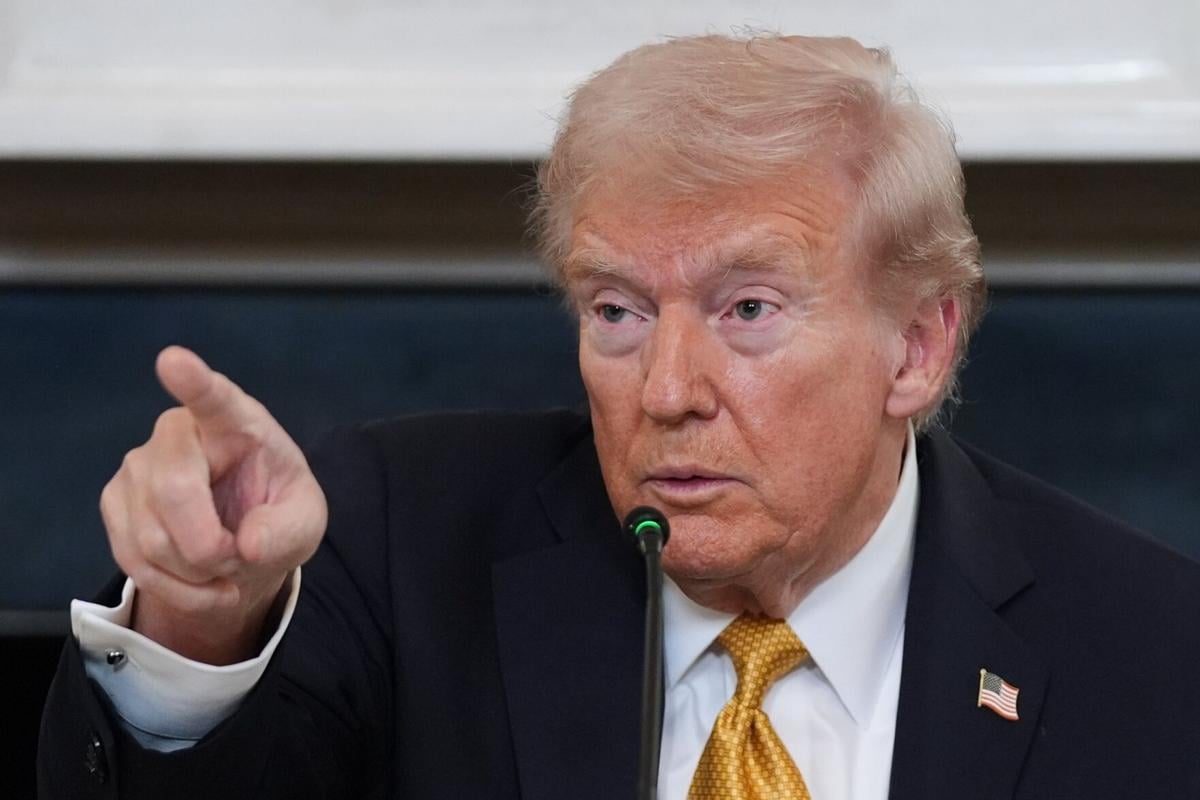
In the 1987 speech, Reagan lambasted tariffs as hurting “every American worker and consumer” and “triggering fierce trade wars.”
After the ad aired, the Ronald Reagan Foundation claimed it “misrepresents” the speech, and that the Ontario government had not asked permission to use the clip.
While the ad edited the speech and lacked context, the theme of Reagan’s full five-minute speech, which the Reagan Library has published on YouTube, is full-throated support for free and fair trade.
Reagan delivered it from Camp David, where he was soon to meet the prime minister of Japan at a time when American sentiment for the country was eroding after its companies flooded America’s market with inexpensive cars and electronics.
Reagan had just placed higher tariffs on various Japanese products to try to stem the damage the imports of cheap Japanese semiconductors had done to US manufacturers. But Reagan was clear: he was “loath” to take that action and believed high tariffs had exacerbated the Great Depression.
Yet by Thursday night, Trump had taken to social media to blast the ad.

“The Ronald Reagan Foundation has just announced that Canada has fraudulently used an advertisement, which is FAKE, featuring Ronald Reagan speaking negatively about Tariffs,” he wrote on Truth Social.
He claimed the ad aimed to “interfere with the decision of the U.S. Supreme Court, and other courts,” and defended tariffs as critical to the US economy and national security.
“Based on their egregious behavior, ALL TRADE NEGOTIATIONS WITH CANADA ARE HEREBY TERMINATED,” he wrote.
In a separate Truth Social post Monday, Trump incorrectly stated that Reagan supported tariffs.
“They fraudulently took a big buy ad saying that Ronald Reagan did not like Tariffs, when actually he LOVED TARIFFS FOR OUR COUNTRY, AND ITS NATIONAL SECURITY,” Trump posted. “Thank you to the Ronald Reagan Foundation for exposing this FRAUD.”
Carney said Friday his country “can’t control the trade policy of the US.”
“We recognize that that policy has fundamentally changed from the policy in the 1980s, 1990s, the 2000s, and it’s a situation where the United States has tariffs against every one of their trading partners in different countries,” he told reporters shortly before boarding a plane to Kuala Lumpur, Malaysia.
Carney said that tariff negotiations with the US had yielded “a lot of progress.”
CNN has also reached out to the office of Dominic LeBlanc, the minister overseeing US-Canada trade.
Ford had first posted the ad online on October 16, writing in a caption: “Using every tool we have, we’ll never stop making the case against American tariffs on Canada. The way to prosperity is by working together.”
A disclaimer under the ad states that it was not approved or sponsored by the Ronald Reagan Presidential Library or the Ronald Reagan Presidential Foundation.
Along with its statement, the Ronald Reagan Foundation offered a link to the full unabridged version of Reagan’s decades-old speech — in which he speaks at greater length about why he opposes tariffs. “More than five million American jobs are directly tied to the foreign export business, and additional millions are tied to imports,” he said in one quote, which was not included in the ad.
The description for the full YouTube video lists the speech as “unrestricted” in both access and use.
Growing tension
Since Trump took office, the centuries-long friendship between the US and Canada has broken down amid bruised feelings over tariffs and Trump’s threat to make Canada the 51st US state. Many Canadians are boycotting American goods, and refusing to travel to the US.
Canada has long been one of the US’ top trading partners; last year, the US imported $411.9 billion worth of goods from Canada, according to government figures.
But Canada’s economy has been hit hard by Trump’s steep sectoral tariffs on autos, steel, aluminum, lumber, and energy — some of the country’s key exports to the US. Those fall under the US-Mexico-Canada Agreement (USMCA), which Trump brokered during his first term and will be under mandatory review next year. Canada’s unemployment rate is now at its highest point in nine years.
“This is the last thing that either country needs,” Jack Buffington, director of the supply chain program at the University of Denver, told CNN after Trump’s announcement. “We need to stabilize the North American supply chain, particularly given the challenges that the US has with China.”
US trade with Canada remains in deficit
President Donald Trump said late Thursday he was ending trade talks with Canada, America’s second-largest trade partner. Although the US still maintains a trade deficit with its northern neighbor, there was a small reduction in the first seven months of 2025 compared with the same period in 2024.
US trade deficit with its largest trade partners, January to July
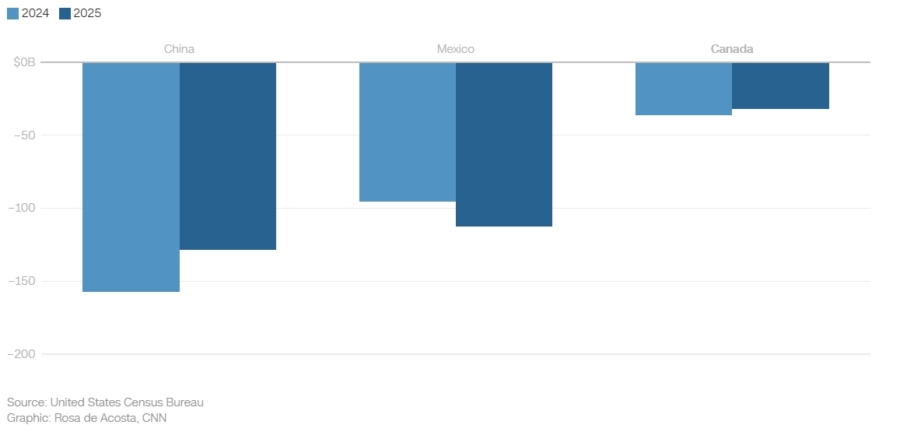
Carney won an election in April with a strident message for Canadians, warning that their relationship with America would change dramatically in the coming years. He has fostered relationships with other Western countries instead; on Thursday, before Trump’s post, he had announced on X that Canada plans to double its non-US exports in the next decade.
“Our core mission is to build a stronger economy — one that doesn’t rely on a single trade partner,” he wrote on X.
The economic relationship has reached a boiling point several times over the course of Trump’s second term. Earlier this year, in the relationship’s tensest moment, Ford threatened to halt exports of Canadian electricity to the United States, which would have sent US energy bills surging. But he ultimately backed off that threat. Trump has also threatened to call off talks with Canada in the past, only to restore negotiations.
Tensions have eased slightly in recent months, however, with Carney meeting Trump at the Oval Office earlier this month. There, Trump joked about a “merger” of the two countries but also praised his counterpart as a “world-class leader.”
LeBlanc, the Canadian trade minister, said negotiators for both countries had left with directions to “quickly land deals” on steel, aluminum and energy. He described the meeting between leaders as “successful, positive, substantial.”
That brief warming, it seems, is over — at least for now.
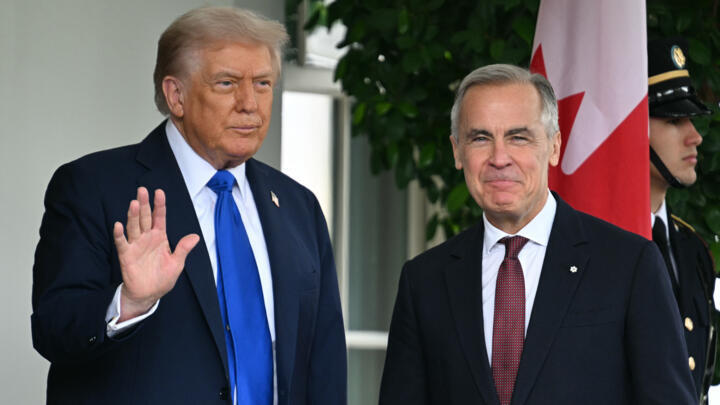
Trump says a Canadian ad misstated Ronald Reagan’s views on tariffs. Here are the facts and context
WASHINGTON (AP) — President Donald Trump pulled out of trade talks with Canada Thursday night, furious over what he called a “fake’’ television ad from Ontario’s provincial government that quoted former U.S. President Ronald Reagan from 38 years ago criticizing tariffs — Trump’s favorite economic tool.
The ad features audio excerpts from an April 25, 1987 radio address in which Reagan said: “Over the long run such trade barriers hurt every American worker and consumer.’’
Trump attacked the ad on Truth Social Friday posting: “CANADA CHEATED AND GOT CAUGHT!!! They fraudulently took a big buy ad saying that Ronald Reagan did not like Tariffs, when actually he LOVED TARIFFS FOR OUR COUNTRY, AND ITS NATIONAL SECURITY.″
The Ronald Reagan Presidential Foundation and Institute criticized the ad on X Thursday night posting that it “misrepresents the ‘Presidential Radio Address to the Nation on Free and Fair Trade’ dated April 25, 1987.”
While Trump called the ad fake, Reagan’s words were real. But context is missing.
Here’s a look at the facts:
Reagan, who held office during a period of growing fear over Japan’s rising economic might, made the address a week after he himself had imposed tariffs on Japanese semiconductors; he was attempting to explain the decision, which seemed at odds with his reputation as a free trader.
Reagan did not, in fact, love tariffs. He often criticized government policies – including protectionist measures such as tariffs – that interfered with free commerce and he spent much of 1987 radio address spelling out the case against tariffs.
“High tariffs inevitably lead to retaliation by foreign countries and the triggering of fierce trade wars,’’ he said. “The result is more and more tariffs, higher and higher trade barriers, and less and less competition. So, soon, because of the prices made artificially high by tariffs that subsidize inefficiency and poor management, people stop buying. Then the worst happens: Markets shrink and collapse; businesses and industries shut down; and millions of people lose their jobs.’’
But Reagan’s policies were more complicated than his rhetoric.
In addition to taxing Japanese semiconductors, Reagan slapped levies on heavy motorcycles from Japan to protect Harley-Davidson. He also strong-armed Japanese automakers into accepting “voluntary’’ limitations on their exports to the United States, ultimately encouraging them to set up factories in the American Midwest and South.
And he pressured other countries to push down the value of the currencies to help make American exports more competitive in world markets.
Robert Lighthizer, a Reagan trade official who served as Trump’s top trade negotiator from 2017 through 2021, wrote in his 2023 memoir that “President Reagan distinguished between free trade in theory and free trade in practice.’’
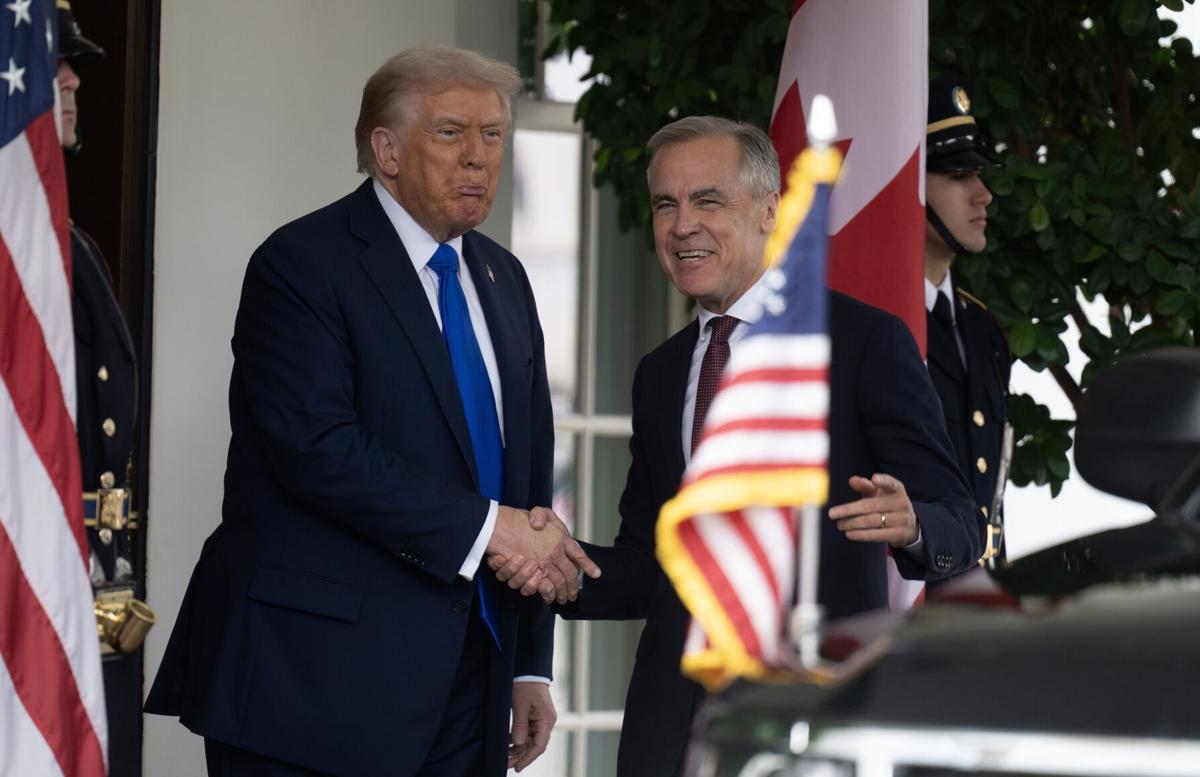
In 1988, an analyst at the libertarian Cato Institute even declared Reagan “ the most protectionist president since Herbert Hoover, the heavyweight champion of protectionists.’’
Reagan, though, was no trade warrior. Discussing his semiconductor tariffs in the April 1987 radio address, he said that he was forced to impose them because the Japanese were not living up to a trade agreement and that “such tariffs or trade barriers and restrictions of any kind are steps that I am loath to take.’’
Trump, on the other hand, has no such reticence. He argues that tariffs can protect American industry, draw manufacturing back to the United States and raise money for the Treasury. Since returning to the White House in January, he has slapped double-digit tariffs on almost every country on earth and targeted specific products including autos, steel and pharmaceuticals.
The average effective U.S. tariff rate has risen from around 2.5% at the start of the 2025 to 18%, highest since 1934, according to the Budget Lab at Yale University.
Trump’s enthusiastic use of import taxes — he has proudly called himself “Tariff Man’’ — has drawn a challenge from businesses and states charging that he overstepped his authority. The Constitution gives Congress the power to levy taxes, including tariffs, though lawmakers have gradually ceded considerable authority over trade policy to the White House. The Supreme Court is set to hear arguments in the case early next month.
Trump claimed Thursday that the Canadian ad was intended “to interfere with the decision of the U.S. Supreme Court, and other courts.’’













:max_bytes(150000):strip_icc():focal(722x378:724x380):format(webp)/farmington-hills-deliver-baby-040924-2-ffd1c156ebc647d6977e889eb9405d6f.jpg?w=1200&resize=1200,0&ssl=1)










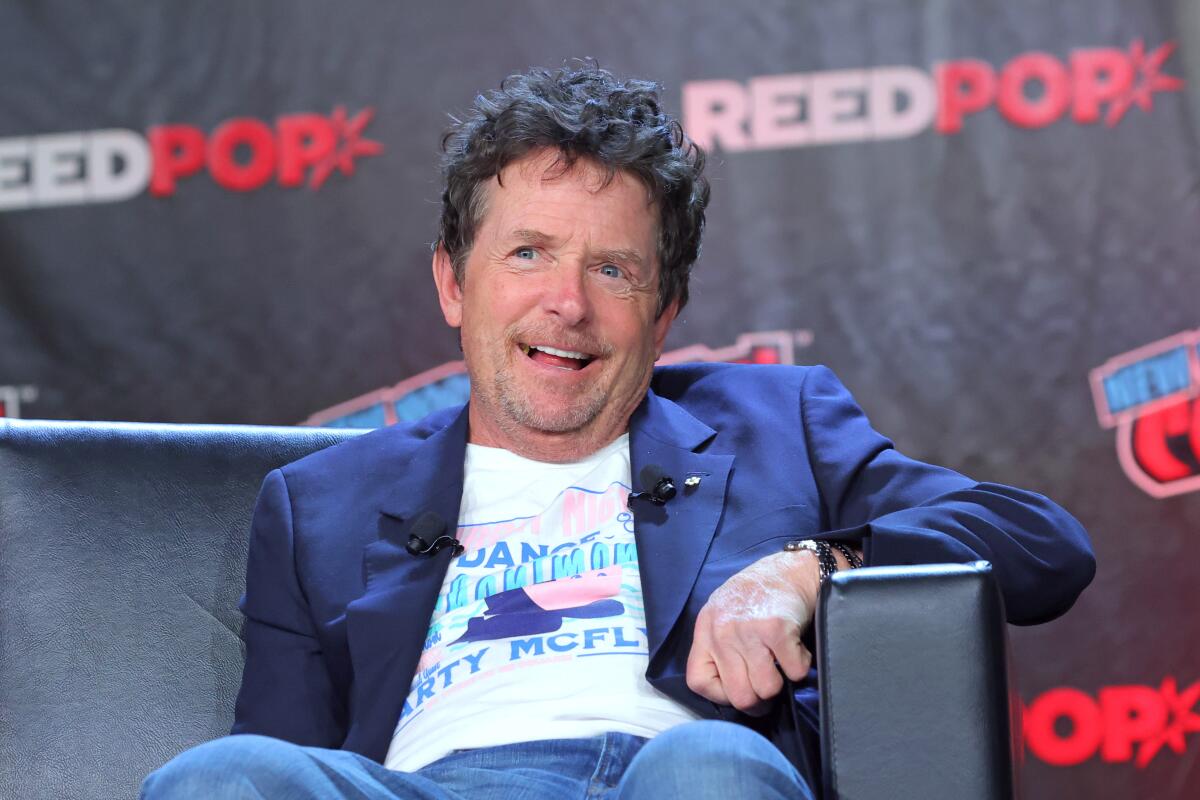











:max_bytes(150000):strip_icc():focal(999x0:1001x2)/Keith-Urban-and-Nicole-Kidman-092925-fb84103d354b43ec9ba325e9671766a2.jpg?w=1200&resize=1200,0&ssl=1)




:max_bytes(150000):strip_icc():focal(999x0:1001x2)/catherine-ohara-013026-7-4b5b413a646d4f15a1fd15ac8b933811.jpg?w=1200&resize=1200,0&ssl=1)


